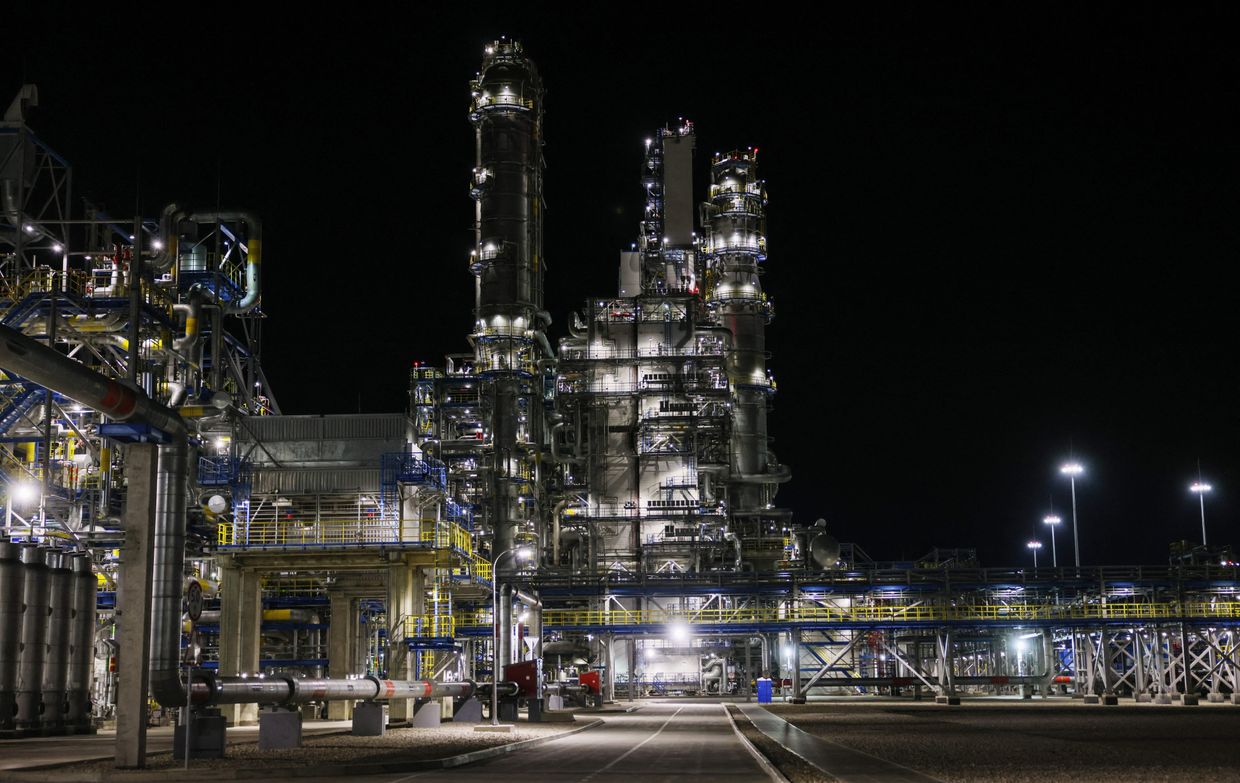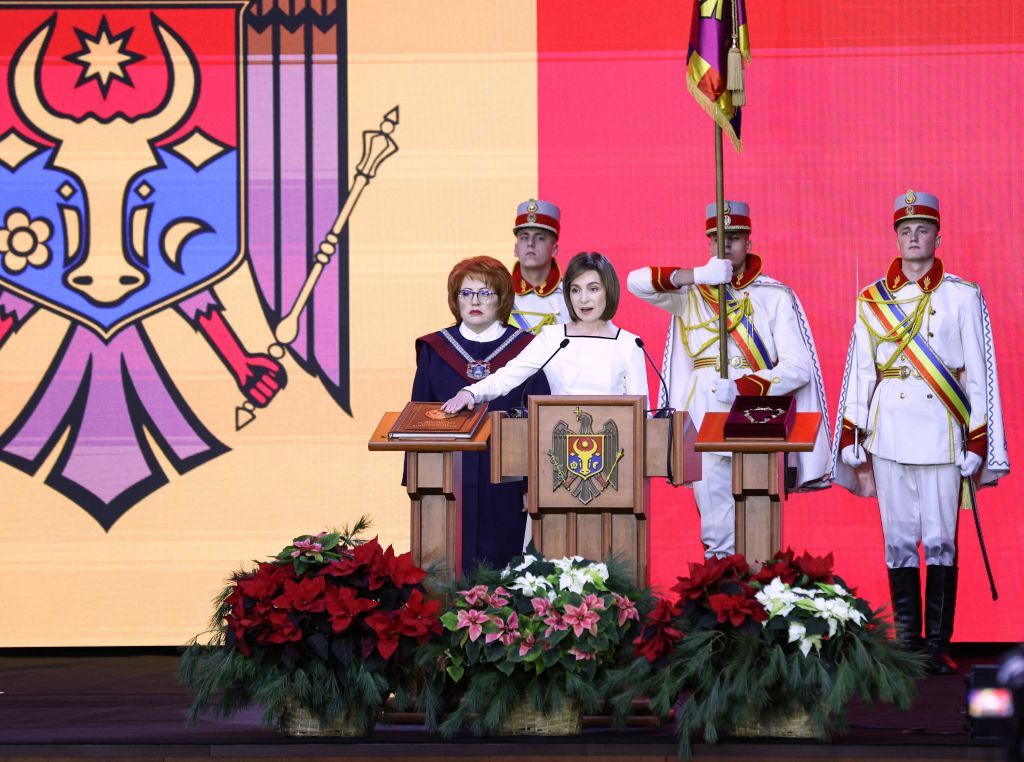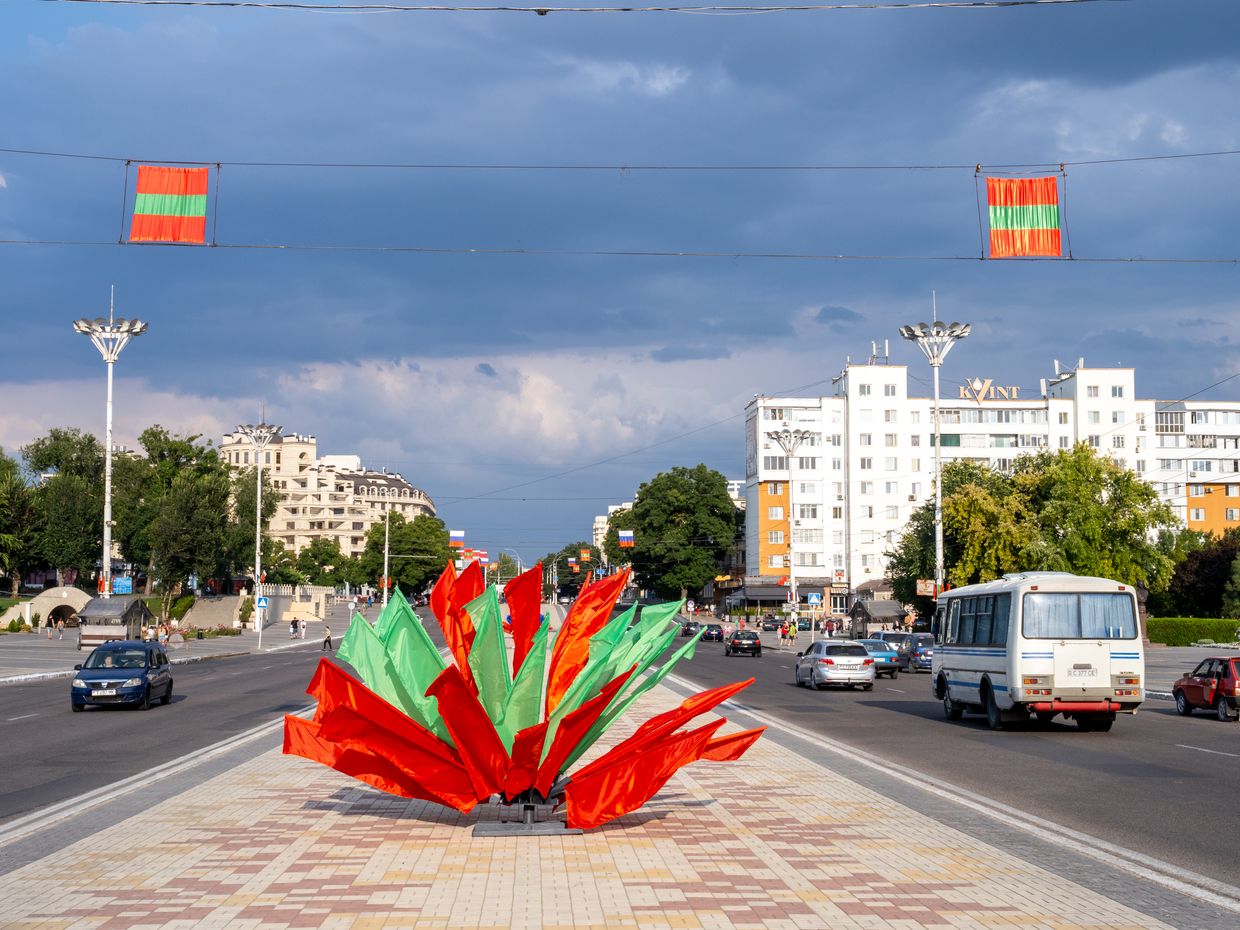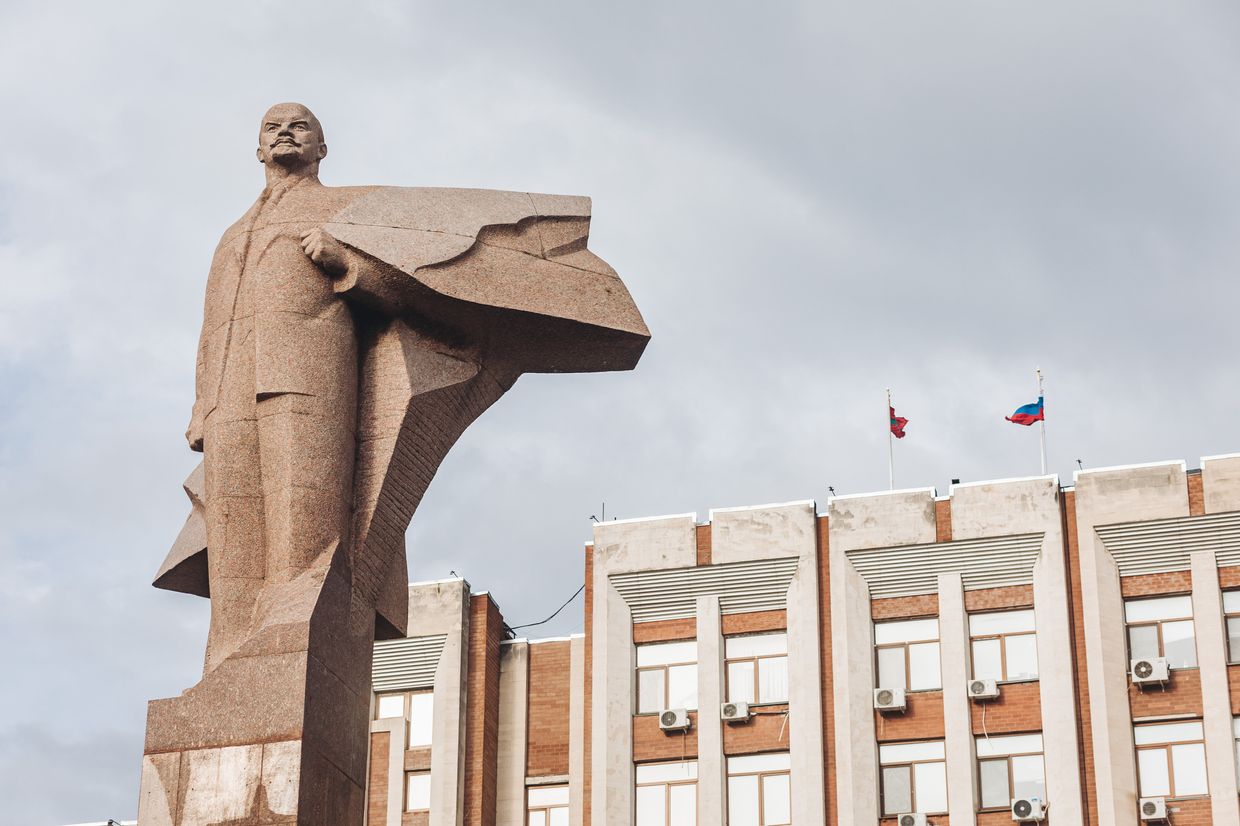Will Transnistria's gas crisis lead to its collapse and reintegration into Moldova?

Cars wait in line at the Bender crossing point between the self-proclaimed republic of Transnistria and Moldova on March 1, 2024. (Daniel Mihalescu/AFP via Getty Images)
By halting natural gas supplies to Moldova on Jan. 1, Russia created an unprecedented economic crisis in the Russian-occupied part of the country — Transnistria.
The crisis prompted a question: will the breakaway region, occupied by Russia since 1992, survive without Russian gas?
Free-of-charge Russian gas had been the backbone of Transnistria's economy and ensured the preservation of the breakaway region and its de facto independence from Moldova.
Some argue that the gas crisis may lead to Transnistria's political collapse and reintegration into Moldova, dealing a blow to Russia's regional influence.
But analysts say that Transnistria's reintegration is unlikely since it would be too difficult for Moldova to achieve, could provoke Russian aggression against Chisinau or destabilize Moldova by increasing the share of pro-Russian voters. They argue that Moldova has not taken any steps in that direction intentionally.
"There are far too many forces and actors in the Republic of Moldova with whose help the Russian Federation will try to prevent a possible effort to reunify the country and reintegrate Transnistria," Ion Manole, head of Moldovan think-tank Promo-LEX, told the Kyiv Independent.
"The goal of this crisis is to destabilize the Republic of Moldova and bring it under Russia's total control, and by no means to lose control over the Transnistrian region."
A more likely scenario is that Russia will use the ongoing gas and electricity crisis to destabilize Moldova itself and try to bring pro-Russian parties back into power in the upcoming parliamentary elections set to be held in the second half of 2025.
No more free gas
Chisinau has not been buying Russian gas since 2022, but Russian-occupied Transnistria continued to get its gas from Russia until Jan. 1, 2025. The halt in gas deliveries on Jan. 1 was due to Ukraine's decision to stop Russian gas transit, including supplies to Moldova, and Moldova's debt for gas supplies.
Transnistria had been effectively acquiring gas free of charge — a political tool that Russia used to keep the region under its control. The breakaway region's debt for Russian gas amounts to more than $10 billion, according to Moldovagaz, a subsidiary of Russian gas giant Gazprom.
Transnistria had been effectively acquiring gas free of charge — a political tool that Russia used to keep the region under its control.
Chisinau's separate debt for Russian gas supplies totals $709 million, according to Gazprom. However, the Moldovan government recognizes only an $8.6 million debt, citing financial audits.
Gazprom said on Dec. 28 it would stop its gas supplies to Moldova on Jan. 1 due to its debt. Kremlin spokesman Dmitry Peskov on Jan. 9 blamed Ukraine and Moldova for Transnistria's gas crisis.
Some 1,500 high-rise buildings in Transnistria were without heating and hot water on Jan. 4, and nearly 72,000 homes remained without gas, Transnistria's unrecognized leader Vadim Krasnoselsky said.

The end of Russian gas supplies via Ukraine has also halted all industrial activity in Transnistria, Sergey Obolonik, the first deputy chairman of Transnistria's self-proclaimed government, said on Jan. 2.
Despite the crisis, Transnistria has rejected Chisinau's offer to help the region purchase gas from Europe, Vadim Cheban, CEO of Moldovagaz, said on Jan. 3.
Transnistria instead expects Russia's Gazprom to resume deliveries of natural gas, Cheban said.
Russia is technically capable of supplying its gas through pipelines via Turkey, Bulgaria, and Romania to Transnistria, but such supplies would have to be approved by Chisinau.
The non-occupied part of Moldova has also been affected by the crisis because it had previously bought electricity from Transnistria's Cuciurgan power station, which used Russian gas as fuel. As a result of the halt in gas supplies, electricity prices in Moldova are rising.
Impact on Transnistria
Analysts say that the crisis is likely to cause discontent in Transnistria but, due to a lack of opposition, the crisis won't have any major political consequences inside the occupied region.
"No matter how dissatisfied the population may be, it will not lead to an increase in opposition ratings because, in essence, there is no real opposition in Transnistria," Serhiy Gerasimchuk, a Moldova and Romania expert at the Ukrainian Prism think-tank, told the Kyiv Independent.
Anatoly Dirun, a political analyst from Transnistria currently based in Chisinau, also said that "there is no political opposition or alternative political forces (in the breakaway region) that could criticize the current leadership."
"It is difficult to speak of any potential political changes at this point," he added.
Reintegration into Moldova
The energy crisis in Transnistria prompted speculation that the Russian-controlled entity's survival is at stake and that it may be forced to reintegrate into Moldova at some point in the future.
"The people in Transnistria are realizing that the so-called 'government' in Tiraspol cannot ensure basic needs like heating, gas or electricity," Eugen Muravschi, an associated expert at Chisinau-based watchdogs WatchDog MD and CPR-Moldova, told the Kyiv Independent. "Naturally, the question will arise — what then is the point of this regime?"
"The people in Transnistria are realizing that the so-called 'government' in Tiraspol cannot ensure basic needs like heating, gas or electricity."
He argued that the "situation is a big blow to the credibility and legitimacy of the Tiraspol regime, but also to the narrative of Russia as a trustworthy protector."
Manole told the Kyiv Independent that "in the absence of a direct corridor (linking Russia and Transnistria), the possibilities of the Russian Federation to further control and influence the Republic of Moldova through the Transnistrian region have diminished since Russia's annexation of Crimea and virtually disappeared with the full-scale invasion of Ukraine in 2022."

Despite that, analysts argue that Transnistria's reintegration into Moldova is unlikely.
"Questions related to reintegration are currently out of focus. In the short term, the crisis is unlikely to trigger any political change," Victoria Nemerenco, a program coordinator at Moldova's Institute for European Policies and Reforms, told the Kyiv Independent.
Manole also said that Moldova is not ready "to reintegrate Transnistria, because in the last 2-3 years Russia has taken care to reactivate another source of instability in the south of the Republic of Moldova (Gagauzia), while there are numerous groups in the country that openly support the Russian Federation and its efforts to occupy Ukraine and implicitly later the Republic of Moldova."
The pro-Western government may be reluctant to reintegrate Transnistria because it would dramatically increase the share of pro-Russian voters in elections.
"In theory, these are suitable circumstances for kicking off the reintegration process," Muravschi said.
"The problem is that the authorities in Chisinau do not seem to have a plan in this regard — they seem preoccupied only with managing the crisis, not turning it into an opportunity. In short, this crisis is shaking the Tiraspol regime, but it will not necessarily topple it without more initiative and assertiveness from the Moldovan government."
Dirun also said that "there are discussions among colleagues in Chisinau that this could lead to the collapse of (Transnistria), but this will not happen."
Russian invasion?
One reason why Moldova's reintegration is unlikely is that it may lead to a Russian economic or even military attack. However, Russia will also face difficulties if it decides to launch an actual military operation.
Jamie Shea, a defense and security analyst at Chatham House, told the Kyiv Independent that "Russia is today fully engaged in eastern Ukraine and in trying to push Ukrainian forces out of the Kursk Oblast."
"So it would probably have to halt its operations at least for a period in order to invade and subsequently occupy Moldova, although this country is much smaller and with far less defensive capacity than Ukraine," he added.
He also said that Russian troops currently deployed in Transnistria "are not trained and equipped for offensive operations and would not be able to move against the rest of Moldova without significant reinforcements."


Russia has a mere 1,700 troops in Transnistria, while Transnistria's army comprises about 7,500 troops.
It would also be difficult for Russia to move troops to Moldova because it does not control any Ukrainian areas adjacent to the country, such as Odesa Oblast.
"Russia would also need to transport troops by air, and the transport planes could easily be shot down by Ukraine's air defense or over the Black Sea," Shea said. "It would be a dangerous undertaking to move Russian ground forces and aircraft across Ukrainian territory in a wartime situation."
He added that, instead of a direct invasion, Russia might "use pro-Russian groups inside Moldova and Transnistria to destabilize the country and organize violence and disturbances."
Muravschi also said that "as long as Russia does not advance on the southern front in Ukraine and obtain a land bridge towards Transnistria, it would be very difficult for them to mount a military operation against Moldova."
Destabilization
Analysts argue that, rather than using military force, Russia is more likely to use the gas and electricity crisis in Moldova to destabilize the political situation in the republic and help pro-Kremlin groups win the upcoming parliamentary election, which must be held in the second half of 2025.
Moldovan authorities, independent observers, and officials from the EU and the U.S. have pointed to a malign influence campaign involving criminal networks and political groups tied to Russia. Moldovan lawmakers claimed that Moscow had spent millions of dollars to fund Alexandr Stoianoglo, a pro-Russian candidate who lost to pro-Western President Maia Sandu in the Nov. 3 presidential election.
Simultaneously with the election, Moldova held a referendum on adding the country's aspiration to join the EU to its constitution, with 50.35% of the voters supporting the move and 49.65% voting against it.
A majority of voters living in Moldova voted against Sandu and amending the constitution, and the narrow victories were achieved due to the support of Moldovans living abroad, who account for nearly 15% of all registered voters.
"Why would Moscow need (a military operation) now, if it can achieve an electoral victory and have Moldova fall into the Kremlin's hands?" Gerasimchuk said.


He also said that Russia may "choose a candidate capable of negotiating with Gazprom to restore gas supplies."
"Naturally, with promises of this kind, reinforced by unambiguous signals from Moscow, any politician or political force could gain the support of the socially vulnerable population and thus improve their results in the parliamentary elections," Gerasimchuk added.
"In such conditions, Moldova risks descending into governance chaos, where a weakened president will rely on an unstable parliament, which could lead to a prolonged socio-economic crisis," he added. "In this situation, European integration will be off the table."
Muravschi said that "pro-Russian parties are claiming that this crisis is the result of the government's 'Russophobia' and "promise a secure supply of cheap energy from Russia if they come to power."
He added that "the popularity of the ruling pro-European party has been eroding for years now and the energy crisis is not helping them."
"At the moment, it seems impossible for Maia Sandu's party to retain a parliamentary majority by themselves at the next election," Muravschi said. "Russia's goal is clearly to destabilize the situation in Moldova, undermine the government, and help pro-Russian parties win the parliamentary election."
Nemerenco also said that "energy dependence has historically been one of Russia's key tools for exerting pressure, and the current crisis offers Moscow an opportunity to exploit Moldova's vulnerabilities."
"Rising energy prices and supply insecurity could directly affect household incomes and living standards, increasing public frustration; and the president, as well as the pro-European government, could thus become vulnerable to blame, even if the crisis stems from external factors," she said.















